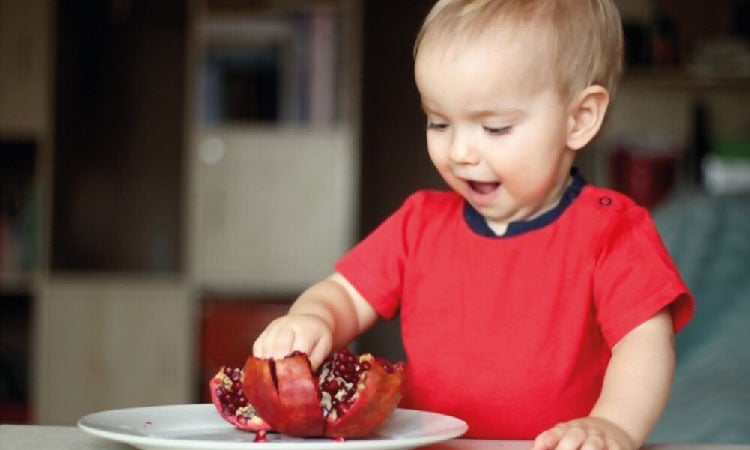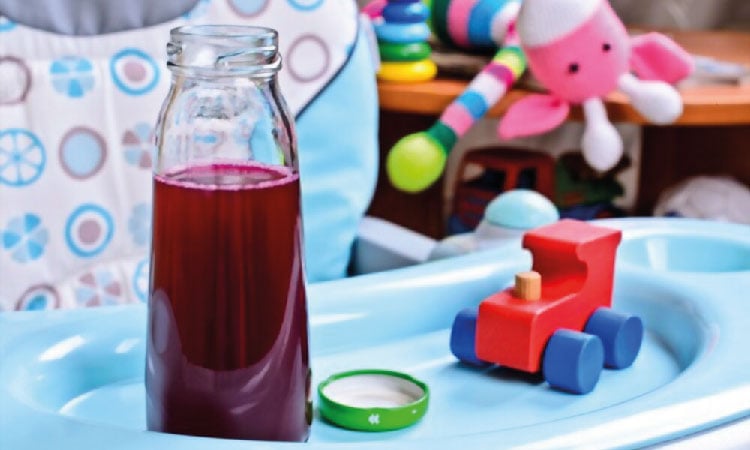At about the six-month mark, you can start feeding your infant solid foods. While you are compiling a list of foods that are appropriate for your baby, pomegranate can appear on the list at some point. This fruit is a superfood for infants because of its high nutrient content. Pomegranate may be a healthy option for babies, but it should be introduced gradually and in small amounts to prevent gagging and choking. Keep reading to learn everything about introducing pomegranates to babies.
Is Pomegranate Safe For Babies?
The seeds from pomegranate are completely safe for your infant to eat, and they also contain a wealth of nutrients that will help your baby’s growth and development. once the baby reaches the 6-month benchmark, you can serve pomegranate to the baby, but only in juice form.
Related Reading: Top 10 Choking Foods For Toddlers
Eventually, once he has reached a certain age, you may start giving him the pulp of this fruit without the seeds. Vitamins A and E, potassium, iron, fiber, folic acid, and minerals are just some of the many nutrients that make pomegranate a fantastic dietary addition for babies.
When Can You Introduce Pomegranate To Babies?
You can introduce pomegranates into the diet of your little one after he or she is 6 months old. Initially, it should be introduced in the form of liquid, and slowly, when they start feeding on solids, you can introduce the fruit in the form of a puree. The seeds of pomegranates are crunchy and most people like to consume them directly.
Babies should only be fed pomegranate in the form of juice or puree due to the risk of choking. Start off slowly and with little amounts of food. Until he is ready to ingest the pulp, offer it as juice. Babies may start eating the pulp when they are about nine months old.
When Should You Feed Your Infant Pomegranate Juice?
Vitamin C improves iron absorption1. Pomegranate juice, if given to the baby with meals will contribute to the body’s absorption of iron from the diet since it is high in vitamin C. For serving, dilute one part juice with ten parts of boiled water. To avoid tooth decay, always provide juice to babies in a cup rather than a bottle. Always keep in mind that breast milk or formula should be a baby’s main source of nutrition for the first year. Juices should only be given on rare occasions or when the baby is sick.
Related Reading: 15 Easy To Make Finger Foods for Babies With No Teeth
Nutritional Value Of Pomegranate

Red in color, the pomegranate is a seeded fruit with smooth and silky skin. The edible part of the pomegranate consists of 85% water. It has a low pH (often below 4.0), a high acidity (up to 20 g of citric acid/L of juice), and a high sugar content (mostly fructose and glucose) of 70-180 g/L2.
In addition, it has a good number of micronutrients and bioactive chemicals, including phenolics and flavonoids, which may have potential anti-inflammatory, anti-carcinogenic, and antioxidant properties3. The fruit’s high levels of Vitamin C, A, and E and other antioxidant vitamins and minerals help to neutralize harmful free radicals4.
According to this source, 100 grams of pomegranate contains
- Calories: 68
- Total Fat: 0.3g
- Cholesterol: 0mg
- Sodium: 3mg
- Total Carbohydrate: 17.17g
- Dietary Fiber: 0.6g
- Sugars: 16.57g
- Protein: 0.95g
- Calcium: 3mg
- Iron: 0.3mg
- Potassium: 259mg
- Vitamin A: 5mcg
- Vitamin C: 6.1mg.
Health Benefits Of Pomegranate For Babies
As compared to green tea and red wine, pomegranates may contain as much as three times the number of antioxidants5. With its many potential health benefits, pomegranate has quickly become one of the most popular choices as a first solid food for infants as young as 6 months. This fruit may be given to your child in any form, depending on his or her age, since it provides a substantial amount of nourishment.
The following are some of the many ways that pomegranate might help your baby
1. Helps to boost immunity
Newborns’ immune systems aren’t fully developed. It strengthens as the baby grows. Because of this, infants are more likely to get sick. Vitamins C and E in pomegranate, along with other antioxidants, vitamins, and minerals like iron, folate, and potassium, have unique properties that protect babies from illness6. Ellagitannin is a type of antioxidant found in pomegranate. It helps reduce inflammation and could help prevent bacterial infections7.
Related Reading: Ghee For Babies- When, How, And Health Benefits
2. Excellent home remedy for babies’ digestive issues
Pomegranate juice has been shown to be an effective treatment for a variety of digestive disorders, including nausea, vomiting, diarrhea, and dysentery8. Babies are more likely to experience these constipation and loose motions issues once they start solids because everything is new! Pomegranate juice, when given to infants, helps treat digestive issues by combating the bacteria that are the root of the problem.
Introducing new foods at around 6 months can also cause constipation in babies. A single large pomegranate fruit has about six grams of dietary fiber9 , which is enough to help with constipation.
3. Reduces fever
Fevers can be brought down with pomegranate juice10. Babies often get fevers. Babies with fevers can benefit from a dose of pomegranate juice, which not only reduces the temperature but also restores nutrients lost during the illness. Pomegranate is well-known for its ability to boost platelet count and immune function11.
Related Reading: Top 9 Indian Home Remedies For Fever In Babies
4. Pomegranate for baby cough
Pomegranate is a good way to treat baby cough because of its anti-inflammatory and antioxidant properties.When it comes to using pomegranate for baby cough, pomegranate juice with a touch of pepper and ginger is a winning combination. There is some evidence that pomegranate extracts can inhibit the growth of viruses like the influenza virus, the root cause of the common cold and cough12.
5. Aids in the eradication of intestinal worms
In babies, intestinal worms are a common problem. Deworming is done on babies on a regular basis until they reach a certain age. One possible deworming treatment for babies is pomegranate13.
Babies who are given pomegranate juice on a daily basis may be better able to fight off parasites and experience less severe parasite-related symptoms. These parasites, found in both the small and large intestines, thrive on the nutrition the fruit provides. Consequently, its anthelmintic properties eliminate those parasites14.
6. Contribute to the growth and development of the baby
Pomegranate has a lot of the nutrients a developing infant needs. Vitamins C and E, as well as minerals like folate, potassium, fiber, and antioxidants, play crucial roles in your baby’s development and growth.
Related Reading: 10 Indian Baby First Foods 4-6 Months
7. Safeguards the liver
All the good things about pomegranates that have already been mentioned are just the beginning. Pomegranate also ensures that the liver remains in good condition as per this source. Your child’s liver health is too important to ignore. Pomegranate consumption can help to reduce the symptoms of jaundice, food poisoning, and other illnesses.
Precautions To Take While Giving Pomegranate To Babies

While introducing pomegranate to infants, keep the following in mind.
- Babies should not eat seeds. Before they can chew on solid food, give them pomegranate juice
- While making the juice, don’t get any of the white skin in it or it will have a bitter aftertaste.
- Over-administration of the juice may lead to gastrointestinal distress, so stick to the recommended dosage
- Due to the potential for tooth decay, the juice should be avoided just before bedtime.
- Avoid serving pomegranate with other foods, and monitor your baby’s response to pomegranate juice or pulp separately
- Stop feeding and see a pediatrician quickly if you notice an allergic reaction or intolerance symptoms
When Can Baby Eat Pomegranate Seeds
Pomegranate seeds are completely edible and high in vitamins and minerals. Children from 12 to 18 months may consume pomegranate seeds. At this age, entire pomegranate seeds may be served on their own.
When adding whole seeds to smooth foods like yogurt, your infant or toddler may not understand it should be chewed well and accidentally ingest them. It is safer to offer entire seeds on their own until your tiny one is used to eating and digesting them. When the infant is 18 to 24 months old, add them to savory foods or blend them into smoothies.
Related Reading: How To Use Orange Juice For Baby Constipation (10 Months & Above)
How To Make Pomegranate Juice For Babies?
After six months, pomegranate juice is the best method to introduce the fruit into a baby’s diet. Here’s how to create baby pomegranate juice:
Deseeding the fruit and blending the pulp in a mixer or blender is the best technique to produce pomegranate juice for newborns. Collect the juice by straining it. No sugar should be added. Give the fruit to your infant in little amounts in the late morning, afternoon, or evening. When introducing a new food or vegetable to your baby, allow enough time to check for allergies and get your infant adjusted to the taste.
Note: It is best to avoid serving juice of any sort until the child is two years old, so if you must provide pomegranate juice, do it as an infrequent treat. The juice contains a lot of beta-carotene, which their bodies convert to vitamin A to keep their eyes, immune system, and skin healthy. Yet, the naturally present sugar in pomegranate juice becomes very concentrated when the liquid is extracted from the seeds, as it does in all fruit juice. Moreover, when a fruit is juiced, some of the beneficial benefits of fiber and other plant chemicals that help the microbiota are lost.
The Risks Of Giving Babies Pomegranate To Babies
When introduced properly, pomegranate and pomegranate juice are safe for babies. There are no known side effects of pomegranate for babies. However:
- Allergic reactions to pomegranates are unusual but not unheard of 15
- Please be aware that those who suffer from oral allergy syndrome may be allergic to pomegranates16
- Pomegranate is acidic in nature. Keep in mind that a rash may appear wherever the acidic fruit made contact with the skin (typically the area around the mouth, cheeks, and chin). If this occurs, try patting the affected area with a cold washcloth (rather than rubbing), and the discomfort should go away
Just like with any new food, it’s best to start with a small amount and gradually increase it over the first few servings. If there is no reaction, you can increase the serving size at subsequent meals.
How To Select And Store Pomegranates For The Best Taste
While selecting a pomegranate from the grocery store, choose one that is a deep red color and feels heavy for its size. Find one with smooth, flawless skin, and scratch it gently. It is likely ripe if it is soft and relatively simple to scratch.
The shape of the fruit should resemble a squared-off circle. If a pomegranate has this shape, it indicates that the seeds contained within the fruit have developed to their fullest potential in terms of juice content.
Avoid exposing the pomegranate to direct sunlight while storing it. You should store it somewhere cool and dry. A second option is to keep it in the fridge for up to two months.
After you’ve removed the arils or juice from the fruit, store it in the fridge for no more than five days.
Conclusion

Because of its high nutrient content, pomegranate is a great addition to a baby’s diet. The antioxidant, anti-inflammatory, and anticarcinogenic properties of pomegranate may benefit your baby’s health. Be sure to administer it in a manner that is suitable for the child’s age, and avoid giving excessive amounts of it, as this could defeat the purpose of including it in the diet.
Before introducing the fruit to your baby’s diet, you can even talk to your regular pediatrician about it. After six months of age, it is perfectly safe to give a baby pomegranate juice. Make sure there are no artificial or added sweeteners in the juice, as these could have a negative effect on your baby’s health.
FAQ’s
Yes. Small children should not be given pomegranate seeds because of their round and hard shape. Whole pomegranate seeds are just as easy to accidentally ingest as corn kernels because of their diminutive size. Flatten each seed with a fork before serving, or wait until your baby can pick up small pieces of food and chew and swallow.
No. Store-bought pomegranate juice contains preservatives and artificial sweeteners. Thus, instead of giving babies artificially sweetened pomegranate juice, make it at home with fresh fruit or buy 100% pure juice.

